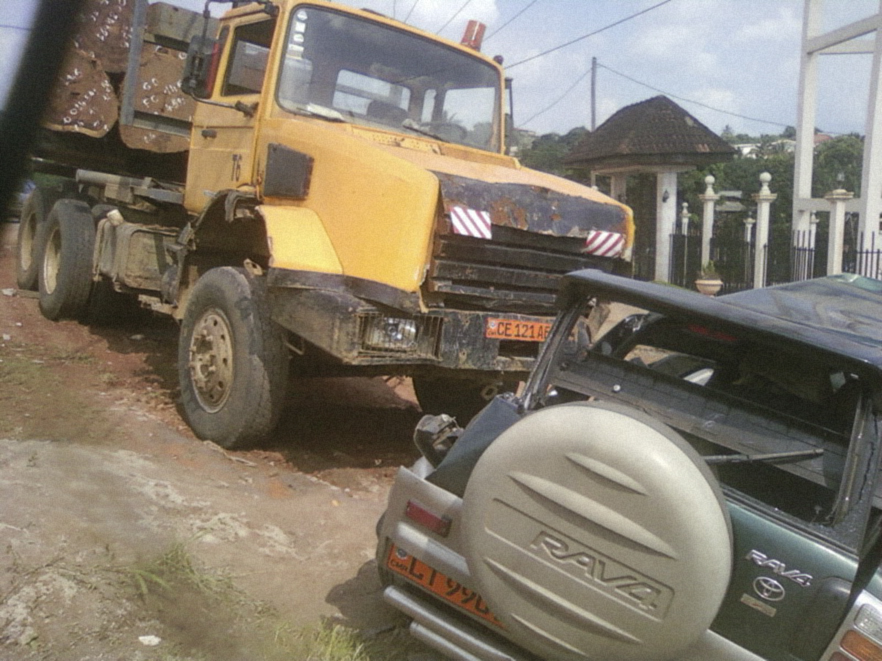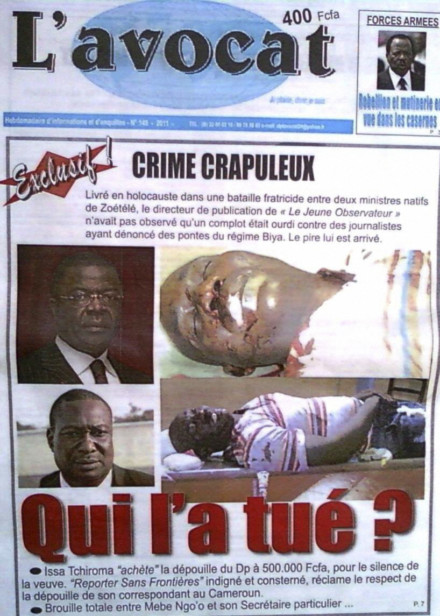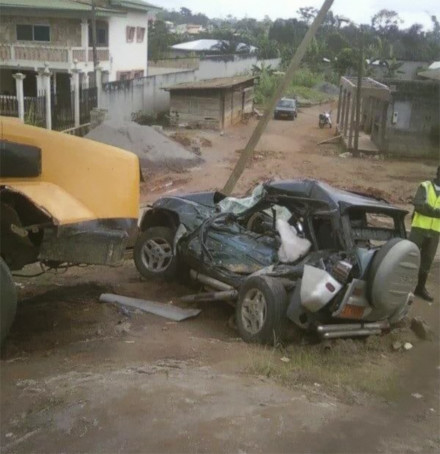4 November 2011
Yaoundé, Cameroon
Jules Koum Koum
Profession
Media
Motive
Exposure of illegal activity
Political dissent
Whistleblowing


Adolfo Olivas


Ahmed Divela


Amit Jethwa


Artan Cuku


Babita Deokaran


Bayo Ohu


Berta Cáceres


Bhupendra Veera


Bill Kayong


Boris Nemtsov


Boško Buha


Chai Boonthonglek


Charl Kinnear


Chut Wutty


Chynybek Aliev


Cihan Hayirsevener


Daphne Caruana Galizia


Darío Fernández


Derk Wiersum


Deyda Hydara


Édgar Quintero


Edmore Ndou


Edwin Dagua


Federico Del Prete


Fernando Villavicencio


Gezahegn Gebremeskel


Gilles Cistac


Habibur Mondal


Igor Alexandrov


Jacob Juma


Ján Kuciak


Javier Valdez


Joannah Stutchbury


José Ángel Flores


Jules Koum Koum


Kem Ley


Luis Marroquín


Mahamudo Amurane


Marcelo Rivera


María Elena Ferral Hernández


Marielle Franco


Milan Pantić


Milan Vukelić


Muhammad Khan


Nelson García


Nihal Perera


Oliver Ivanović


Orel Sambrano


Perween Rahman


Peter R. de Vries


Rajendra Singh


Salim Kancil


Sandeep Sharma


Sikhosiphi Radebe


Slaviša Krunić


Soe Moe Tun


Victor Mabunda


Virgil Săhleanu


Wayne Lotter


Yuniol Ramírez


Zezico Guajajara
4 November 2011
Yaoundé, Cameroon
Profession
Media
Motive
Exposure of illegal activity
Political dissent
Whistleblowing
On 4 November 2011, investigative journalist Jules Koum Koum, 51, died after his vehicle was crushed in a collision with a timber truck on the outskirts of Yaoundé, the capital of Cameroon. Koum was rushed to hospital but died from his injuries soon after. At first glance, the incident may have appeared to be a clear-cut motor-vehicle accident, but the circumstances surrounding his death remain mysterious.
Koum was the editor of a fortnightly independent newspaper, Le Jeune Observateur, and the Cameroonian correspondent for Reporters Without Borders (RSF in French). He was known for his investigations into organized crime, corruption, nepotism and, most notably, his exposing of the inexplicable amount of wealth amassed by Cameroon’s former Minister of Defence, Edgard Alain Mebe Ngo’o.
Although Koum had been tenacious in all of his investigations, his criticism of Mebe Ngo’o had been especially relentless. He publicly challenged Mebe Ngo’o to explain how he had managed to accumulate such a large fortune in just 10 years while earning the ordinary salary of a civil servant. In an open letter to Mebe Ngo’o, published in 2011, Koum listed some of the minister’s alleged possessions, which included fleets of vehicles (ranging from dump trucks, bulldozers and excavators to scores of luxury and vintage cars), castles, overseas apartments, luxury hotels, and hundreds of hectares of land in Yaoundé and the resort town of Kribi.
In 2009, RSF had expressed concern at the repeated intimidation and harassment Koum had suffered for his coverage of corruption. Reportedly, in September 2009, a group of armed men broke into his house and stole documents he was keeping as evidence against several high-profile government officials (including Mebe Ngo’o).
In the open letter, Koum accused the minister of mafia-style business tactics, and implicated him in a burglary at the offices of Minister of Finance Essimi Menye, claiming that Menye was a ‘target’ because of his ongoing investigations into Mebe Ngo’o’s expenditure.
Koum also claimed that Mebe Ngo’o had sent Colonel Bidja Henri Robert, Cameroon’s head of military security, a briefcase of cash to bribe him, but that he had refused to be silenced. Since then, Koum had reportedly received death threats from Mebe Ngo’o, which he referred to in the open letter:
[S]ince you have threatened to kill me, know that the destiny of another man can never be found in the hands of another man. Know that it will be difficult for you to benefit from all the fortune you have been amassing every day for the past ten years, as long as we are here. If you get me assassinated, a thing I am not afraid of, know that neither you nor your children would have a peaceful existence, because there will always be people who will demand that you render account for your deeds.
It was just a few months after this public challenge to Mebe Ngo’o that Koum died. In what may or may not be a coincidence, Koum was about to launch a radio station in Yaoundé that week, and had plans to establish a television channel – developments that could have had serious consequences for those he was investigating.
At the time of writing, eight years after Koum’s death, no arrests had been made, and there were no significant leads in the investigation. It was reported that there were no tyre marks on the road surface to indicate that the driver of the truck had braked to avoid the head-on collision, and that the driver had ‘disappeared’, adding to the suspicion that the crash was not accidental. Some reports even suggest that the truck had chased Koum to Ahala, a neighbourhood just outside Yaoundé.
Shortly after Koum’s death, a police source confirmed that they were ‘working seriously on this case because a majority of Cameroonians would see the hand of the Minister of Defence Edgard Alain Mebe Ngo’o [in his death]’. A source in the Ministry of Communication revealed that the police were particularly concerned with the case not because of the Mebe Ngo’o angle but because Koum was the country’s representative for RSF: ‘The government does not want, once again, to be faced with criticism from the West concerning press freedom in Cameroon. The political situation is already very complicated to manage as concerns relations with Western chancelleries,’ the official declared.

Koum Koum's vehicle and the timber truck that crushed it

A front page report of Koum's assassination asks: 'Who killed him?

Koum Koum's vehicle and the timber truck that crushed it
Despite these concerns, police investigations have yielded no results, seemingly granting impunity to those who order these kinds of assassinations, and offering little comfort to those investigating organized crime.
Of some consolation is the fact that, on 5 March 2019, Mebe Ngo’o was arrested and charged with the embezzlement of public funds to the value of CFA196 billion (approximately US$392 million). He is currently serving time in Kondegui Prison in Yaoundé.
Most of the evidence used against Mebe Ngo’o and his wife, Bernadette, who was subsequently also arrested, came from investigative reports written by Koum. ‘No one will forget Jules Koum Koum’s courage and commitment,’ said Jean-François Julliard, secretary general of RSF. ‘Nothing scared him. He was always pressing the Cameroonian authorities to do more for media freedom. He distributed Reporters Without Borders assistance grants to fellow journalists and visited them when they were in prison. His objectivity, determination and active presence on the ground made him an exemplary correspondent. Media freedom has lost one of its most ardent defenders.’
Koum left behind his parents, wife and three children, Thierry, Jessica and Dorette. When asked about the death of her husband, his wife said: ‘I do not want to say anything now that would traumatize our children. Furthermore, those who murdered my husband are still free and roaming the streets. They may decide to come after me and our kids. All I can say is that since man has refused to give us justice, we leave everything in the hands of God Almighty.’
Although Mebe Ngo’o was charged with embezzlement, the apathy shown by the police in uncovering the truth behind Koum’s death does not bode well for journalists who expose organized crime and corruption. The fact the police investigation has stalled reinforces the belief that the passage of time always benefits the murderers. Organized crime derides law and order, and presents journalists with one of two choices: speak out and risk their lives or remain silent.


16 January 2019
Accra, Ghana
Ahmed Divela


23 August 2021
Johannesburg, South Africa
Babita Deokaran


20 September 2009
Akowonjo, Lagos State, Nigeria
Bayo Ohu


18 September 2020
Cape Town, South Africa
Charl Kinnear


16 December 2004
Kanifing, Gambia
Deyda Hydara


22 April 2017
Beitbridge District, Zimbabwe
Edmore Ndou


21 April 2018
Johannesburg, South Africa
Gezahegn Gebremeskel


3 March 2015
Maputo, Mozambique
Gilles Cistac


5 May 2016
Nairobi, Kenya
Jacob Juma


15 July 2021
Kiambu, Kenya
Joannah Stutchbury


4 October 2017
Nampula, Mozambique
Mahamudo Amurane


22 March 2016
Mbizana, Eastern Cape, South Africa
Sikhosiphi Radebe


10 January 2018
South Africa
Victor Mabunda


16 August 2017
Dar es Salaam, Tanzania
Wayne Lotter